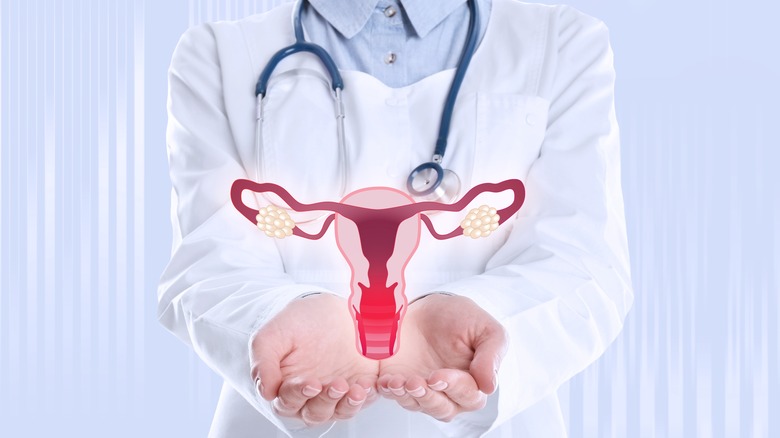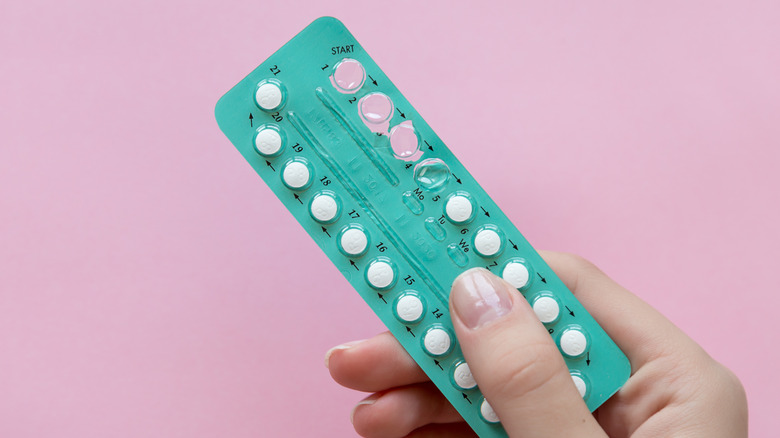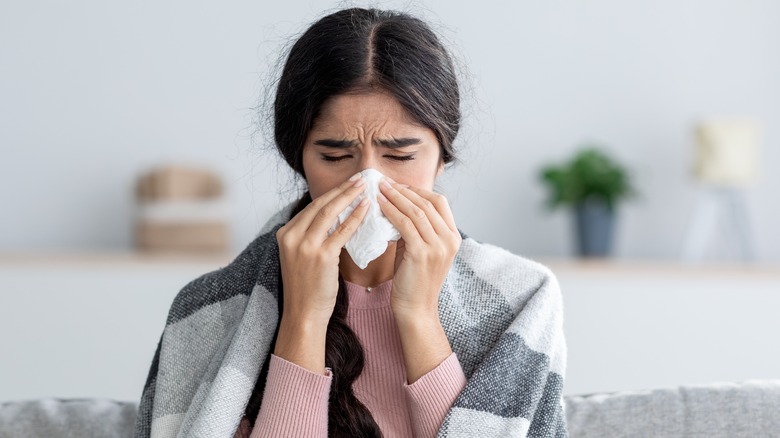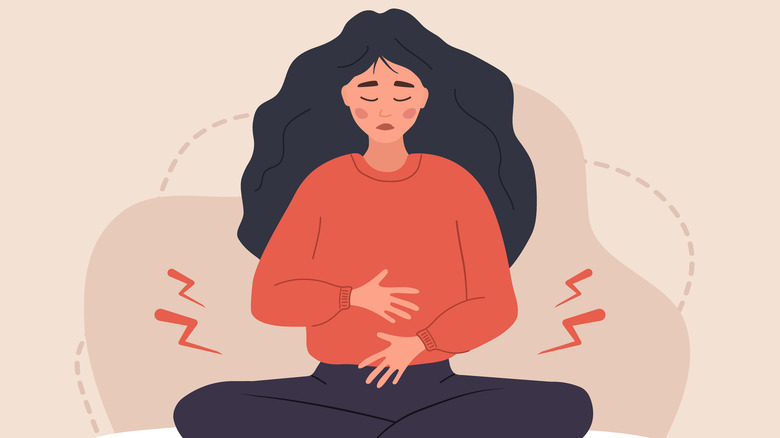The Unexpected Reasons You Could Have Chronic Yeast Infections
Let's face it, yeast infections are never fun to endure — all that itching and burning is frankly uncomfortable. But it's a common condition: According to the Mayo Clinic, 75% of women have faced or will face a vaginal yeast infection at some point in their lives. But what exactly is a yeast infection, and why do some of us keep getting one repeatedly?
To answer the basics, vaginal candidiasis – the medical name for a vaginal yeast infection — occurs when the natural yeast in our vagina, called candida (per the Cleveland Clinic), is out of whack. This essentially means that there is an overgrowth of yeast, and that the normal balance of bacteria in the vagina is altered. Vaginal itching or burning, discharge that's not usual, and painful urination or sex may all accompany a yeast infection, according to the Centers for Disease Control and Prevention (CDC). The good news is that these symptoms can be easily diagnosed by a health provider by performing a pelvic exam (per the Mayo Clinic). Many remedies also exist, including antifungal creams and ointments or tablets depending on the severity of your infections, according to Johns Hopkins Medicine.
If you're experiencing more than four yeast infections in a year, your case can be considered chronic (via Baylor Medicine). When yeast infections become a recurring scenario, it may be time to determine the underlying factors in your life that could be causing this infection.
Hormonal birth control
Hormonal birth control creates many changes in the body, many of which are positive, according to Planned Parenthood, like regulating your cycle, lessening premenstrual syndrome, and helping with hormonal acne. However, the long list of side effects is undeniable (per American Family Physician). Hormone imbalance is one side effect that not only impacts the whole body, but also can contribute to recurring yeast infections (via Medical News Today).
Many popular forms of birth control like birth control pills, the patch, and even the vaginal ring are a mixture of hormones containing estrogen and progestin (per the American Society for Reproductive Medicine). Unfortunately, the hormones in these birth control methods can disrupt the body's natural balance and thereby lead to yeast overgrowth, according to Medical News Today. In turn, this overgrowth results in a yeast infection.
Research has proven this unfortunate link between hormonal birth control and recurrent infections to be true. A study published in Epidemiology on the risk factors of vulvovaginal candidiasis found that the chance of yeast infections was nearly doubled by the use of oral contraceptives within the last two weeks.
Sexual activity
It's important to note that yeast infections are not considered sexually transmitted diseases (via Medical News Today). Certain types of bacteria and fungi are normally present in our skin, as per the Mayo Clinic, and therefore the exchange of them is common during sex. And sexual activities like any form of penetration or receiving oral sex can introduce new bacteria from your partner's body (via Medical News Today). So, while sexual activity itself does not lead to yeast infection, the risk of developing one can be increased through unprotected sex, oral sex, and even un-sanitized sex toys or aids, according to Everyday Health. If you find yourself with a yeast infection, it is advised to wait to engage in vaginal sex until after your infection clears (as per the Cleveland Clinic). Thankfully, it is possible to help prevent yeast infections, according to Medical News Today, by utilizing condoms or dental dams and keeping your vagina clean and dry after sex.
Weakened immune system
There are certainly many ways to acquire a weakened immune system – autoimmune diseases, genetics, and lifestyle habits are all factors that can lead to compromised immunity (per Johns Hopkins Medicine). When an individual's immune system weakens, so does their ability to fight infections and illnesses, according to Penn Medicine. When this happens, the risk of recurrent vaginal yeast infections increases. According to a 2011 study published in Faculty Opinions, fungal infections like a recurrent yeast infection are unfortunately commonplace in immunocompromised patients. The inflammation caused by yeast infections can also spread and lead to complications if you have a weakened immune system (per Vaginal Yeast Infection (Thrush): Overview). In such cases, medical attention is advised.
Certain medications may compromise your immune system and contribute to yeast infections. For instance, taking corticosteroids, a medication used to treat a range of conditions ranging from arthritis and asthma to lupus or even inflammatory bowel disease, can also increase your chances of a fungal infection (via the CDC).
Antibiotics
If you've ever had a bacterial infection (we're talking step throat, UTIs, and E. coli), then you've probably been prescribed antibiotics (via Medline Plus). This is because antibiotics work by killing the harmful bacteria in your body that is making you sick, thus preventing it from further growing or multiplying. However, according to Medical News Today, the antibiotics we are prescribed can sometimes backfire and kill off the good or healthy bacteria in our bodies.
If you are frequently prescribed antibiotics, the health bacteria in your vagina may be at risk, according to the Mayo Clinic. This is because antibiotics reduce the amount of Lactobacillus, the predominant healthy bacteria in the vagina, which in turn throws off the vagina's pH level and paves the way for a yeast infection, according to a review in Frontiers in Microbiology. However, taking probiotics alongside your prescribed antibiotics may be a solution to saving your body's good bacteria, according to the U.S. News & World Report. If you experience chronic yeast infections and are prescribed antibiotics, it is best to talk to your doctor to find out the best way to proceed.
Sugary diet
Who doesn't love a good sweet? Unfortunately, we've got some bad news for our fellow sugar lovers. According to research findings published in the American Society for Microbiology Journal, a high-sugar diet can lead to an increase in the number of candida cells, commonly known as yeast. This is because sugar provides food for yeast, thus leading it to proliferate (per Everyday Health). In addition, indulging in too many sweets can compromise your body's immunity, making you more vulnerable to infections (via YeastInfection.org).
While one or two sweet treats won't hurt, exceeding your daily sugar intake overtime can lead to problems. When you overindulge in sugar, your body tries to get rid of it through your urine (per Optum Perks). This creates an ideal ground for the sugar-loving yeast to feed on. In order to prevent a recurring yeast problem, try avoiding foods like white flour or rice, as well as any items made up of simple sugars or fermented with yeast, according to Intermountain Healthcare.
Unhealthy hygiene
It might seem obvious that having good hygiene is key to preventing a yeast infection. But sometimes it's not that simple. Many hygiene products that swear by keeping your genital area clean can actually irritate the vagina. According to a 2014 research article published in Environmental Health Perspectives, harsh chemicals in certain deodorizing sprays and powders can actually irritate the vagina and lead to a yeast infection. In fact, douching, a rather common practice among women of cleaning out the vagina with water and a mixture of fluids, can upset the natural balance of bacteria in the vagina (per the Office on Women's Health). While the process itself is used for personal hygiene or aesthetics, it can actually be quite harmful. According to an article published in Epidemiologic Reviews, douching has been linked to developing different diseases such as pelvic inflammatory disease and, of course, recurrent yeast infections.
Periods
As if getting your period wasn't enough suffering, now we can thank our special time of the month for yet another unpleasant symptom — being prone to yeast infections. According to The Normal Menstrual Cycle and the Control of Ovulation, our hormones tend to fluctuate during our menstrual cycle, with estrogen levels initially rising in order to prepare our body for pregnancy, and then naturally falling when our period occurs. This drastic change in hormones, particularly estrogen, can increase your chances of developing yeast infections (per HealthShots). According to DermNet, if you are experiencing recurring yeast infections associated with menstruation, known as cyclic vulvovaginitis, your suspicions can be confirmed with a clinical diagnosis from your doctor.
Your period products may be another source to blame for your chronic yeast infections. For instance, not changing your tampons or sanitary pads frequently during your period can create an ideal environment for yeast to grow (via Prevention). This is because of the excess moisture that builds up and acts as a breeding ground for yeast. In addition, scented menstrual products should also be avoided (per the Cleveland Clinic), as the chemicals can disrupt the natural pH balance of your vagina and lead to an infection.
Pregnancy
When you're pregnant, your body kicks into protective mode by increasing the production of various hormones, including estrogen (per News Medical Life Sciences). The hormone performs a number of beneficial mechanisms in the body to support pregnancy, but unfortunately it can also ward off your vagina's healthy bacteria and lead to a yeast overgrowth issue, according to WebMD. If you develop a yeast infection during pregnancy, you're far from alone. According to an article published in Current Infectious Disease Reports, around 30% of women develop yeast infections during pregnancy. This may be particularly likely during your second trimester (via American Pregnancy Association).
Luckily, research shows that yeast infections can be easily and safely treated during pregnancy. According to an article published in the Canadian Family Physician, patients experiencing chronic yeast infections during pregnancy can safely utilize topical antifungals, antiseptics, and corticosteroids without worrying about causing harm to the fetus.
Menopause
Menopause can be a difficult time, as your body is going through big changes. According to MedlinePlus, these changes can include shifts in hormone levels, thinning of genital tissue, vaginal dryness, and an increased risk of vaginal yeast infections. Now, you may be wondering why yeast infections make the list of symptoms during menopause. The connection has much to do with your vaginal tissue drying out, thereby making it more prone to infections (via WebMD). Vaginal atrophy, marked by thinning, drying, and inflamed vaginal walls, is also common during menopause due to low estrogen levels (per HerKare). This combination of hormonal fluctuations and vaginal atrophy make the vagina more susceptible to urinary tract infections and, of course, chronic yeast infections, according to HealthCentral.
During menopause, your doctor may suggest hormone therapy to manage menopause symptoms (per the Cleveland Clinic). This therapy can include vaginal estrogen, which may lead to yeast overgrowth and act as the culprit for causing frequent yeast infections (per WebMD).
Diabetes
According to the CDC, around 10% of people in the U.S. have diabetes, which is a result of too much sugar in the blood or high glucose levels. If you have diabetes, research findings published in the Cureus Journal of Medical Science have shown you also have a stronger chance of developing chronic yeast infections. Unfortunately, overgrowth of yeast is a common issue for diabetes patients, who typically have increased glucose levels (via Medical News Today). Their bodies try to get rid of the extra sugar through sweat, urine, and mucus (such as vaginal secretions) — which the sugar-loving yeast is immediately drawn to. Thus, a yeast overgrowth issue is born.
If you're diabetic and struggle with persistent yeast infections, you can start by consulting your doctor about lowering your blood sugar (according to Beyond Type 1). Having poorly controlled diabetes, according to EndocrineWeb, greatly increases the likelihood of having severe yeast infections. Much of this can be attributed to a weakened immune system, which makes fighting off infections more difficult (via EPIC Health).
Tight or moisture-trapping clothing
Here's another reason to ditch skinny jeans: increased risk of yeast infections. While a snug fit may be fun on occasion, think about how much breathing room (or lack thereof) these clothes leave you with. All that trapped moisture and sweat from wearing tight clothing daily, especially near your vagina, creates grounds for yeast to grow (via WebMD). This is because yeast thrives in a wet environment, according to Nemours KidsHealth, such as your sweaty workout leggings or tight underwear. And indeed, research confirms this association: A study published in the American Journal of Public Health suggests that tight clothing definitely can predispose the wearer to recurring yeast infections.
When choosing your clothes for the day, it's not only the fit that matters, but the fabric. When it comes to underwear in particular, OB/GYN Alyse Kelly-Jones tells Healthline that she recommends cotton over synthetic fabrics like nylon or spandex. This is because cotton won't trap in moisture, and can give your vagina some breathing room.
Chronic stress
If you're having chronic yeast infections, it may be time to check how much stress you're under. Research published in the journal Mycoses shows that psychosocial factors such as stress can lead to recurrent yeast infections. But how do you gauge if your stress levels are normal? Some telltale signs that you might be experiencing chronic stress are lack of energy, insomnia, lowered social engagement, poor concentration, an achy body, and an appetite that has increased or decreased — especially if multiple of these symptoms persist for weeks (per Yale Medicine).
Experiencing chronic stress means that your body is also likely suffering in different ways, and therefore, your chances of developing a yeast infection increases. This is because stress causes serious damage on your diet and sleep, according to Harvard Health, thereby making you more prone to infections. In addition, increased levels of hormones like cortisol are produced when your body is under continuous stress (via American Psychological Association ). Constant production of cortisol can prove to be really damaging to your immune system and also increase your blood sugar levels, according to the Cheyenne Women's Clinic. The result of this excess sugar and weakened immune system is the rise of a yeast overgrowth issue. While there is no quick cure to stress, if you're looking to avoid chronic yeast infections, start by seeking help to manage your stress, prioritizing sleep, and exercising (via Pfizer).













